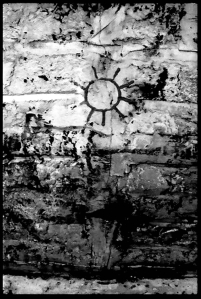The following review was delivered by BC Author Sadhu Binning at the launch of the two Punjabi (Gurumukhi and Shahmukhi) editions of ‘Skeena’ on April 9 in Surrey, British Columbia.
The original Gurumukhi version of the review will be published in the upcoming issue of Vancouver-based Punjabi magazine ‘Watan’.
فوزیہ رفیق دا ناول سکینہ سوچ نوں ہلونا دین والا اک بے حد شکتی شالی اتے پڑھنیوگ ناول ہے۔
ایہہ ناول پہلاں ٢٠٠٧ وچ لاہور توں شاہمکھی وچ چھپیا سی تے ہن ایہہ سرے توں گورمکھی وچ اڈاری بکس ولوں تے وینکوور توں لبروز لبریٹڈ پبلشنگ ولوں انگریزی وچ چھاپیا گیا ہے۔
فوزیہ رفیق سرے کنیڈا رہ رہی پاکستانی پچھوکڑ دی لیکھکا ہے جو انگریزی اتے پنجابی دوواں زباناں وچ لکھدی اے۔ آپنے اگانھ ودھو خیالاں نوں عملی جامہ پہناؤن والی فوزیہ منکھی حقاں لئی ہون والیاں سرگرمیاں دا ہمیشہ حصہ ہندی اے۔
ناول سکینہ پڑھدیاں پاٹھک ایہہ محسوس کرنو نہیں رہ سکدا کہ ایس دی لیکھکا آپنے سماج دے لوکاں بارے ہی ڈونگھی تے ہمدردی والی جانکاری ہی نہیں رکھدی اس دے نال اوہ سماج دیاں آرتھک، سیاسی تے دھارمک ستھتیاں نوں وی وگیانک اتے الوچناتمک نظریے توں دیکھن دی گنبھیر جانکاری وی رکھدی ہے۔ تے اس دے نال ہی مہتوپورن گل ایہہ ہے کہ اوس نوں ساہتک کلا دی وی پوری سمجھ ہے۔
ناول دی ہیروئین سکینہ جاگیردار پریوار دی کڑی ہے جو انسکھاویں حالات وچ رہندی ہوئی وی اوہناں نال پوری طرحاں سمجھوتہ نہیں کردی۔ پر اوہ کوئی بہادر جاں انقلابی کڑی نہیں سگوں اک عام انسان ہے جو اک ساوی پدھری زندگی جین دی چاہوان ہے۔ اوہ بچپن وچ ڈاکٹر جاں ادھیاپکا بنن دے سپنے دیکھدی ہے۔ پر سماج دیاں قدراں قیمتاں اجہیاں ہن کہ اوس نوں آپنی من مرضی دی آرام دی زندگی حاصل نہیں ہندی۔
ناول دا پہلا حصہ جس وچ پاکستانی پنجابی سماج دے جاگیرداری ڈھانچے اندر جاگیردار تے اوس دے کارندیاں دیاں جیونیاں اتے اک دوجے نال ادان پردان نوں درسایا گیا ہے، بہت ہی روچک ہے۔ فوزیہ نے دھرم تے جاگیرو قدراں قیمتاں وچ جکڑے پنجابی سماج دی بہت صحیح تصویر پیش کیتی ہے۔ جاگیرداری سماج اندر زمیناں دے مالک اتے اوہناں دے کارندیاں دے آپسی رشتے بہت بریکی نال چترے ہن۔ ایہہ سبھ کجھ پہلاں اسیں اک ست سال دی ننھی کڑی دیاں نظراں راہیں دیکھدے ہاں۔ ناول شروع وچ ہی پاٹھک نوں پوری طرح آپنے نال تور لیندا ہے اتے اگے جانن دی کھچ اخیر تک قائم رہندی ہے۔
ناول نوں چار حصیاں وچ ونڈیا گیا ہے۔ پہلا جدوں ست سال دی سکینہ آپنی ماں اتے بھرا نال پنڈ رہندی ہے۔ پھیر لاہور، ٹورانٹو تے سرے۔ ایہناں وکھ وکھ تھاواں تے سمیاں وچ سکینہ نوں وکھریاں وکھریاں ستھتیاں وچوں گزرنا پیندہ ہے۔ اسیں پہلاں سکینہ نوں پنڈ دے حالات وچ دیکھدے ہاں، پھیر اک کالج دی ودیارتھن تے ہاکی دی کھڈارن وجوں، پھیر پنڈ گھر دی قید وچ تے پھیر ٹورانٹو اتے سرے وچ۔ اوس دی اک عام انسان وانگ جین دی خواہش نوں ہر پڑاء تے دھارمک، پروارک، سیاسی تے سماجک بندشاں روک لاؤندیاں ہن۔ سکینہ آپنی سہیلی رفو وانگ بہادر جاں انقلابی نہیں۔ پر حالتاں نال سمجھوتہ نہ کرن دی جاں کجھ حد تک ہی سمجھوتہ کرن دی کوشش اوس نوں وکھریاں وکھریاں حالتاں وچ پاؤندی ہے تے کڈھدی ہے۔ گھردیاں دی مرضی انوسار نہ جین بدلے اوس نوں لاہور توں پنڈ لجا کے گھر وچ ہی قید کر دتا جاندا ہے۔ پھیر ٹرانٹو آپنے مرد احتشام تے اوہدی ماں دا اوہ لما سماں تشدد سہندی ہے۔ اس سبھ کاسے دے باوجود اوس وچ جین دی خاہش نہیں مردی اتے اوہنوں جد وی موقع ملدا ہے اوہ آپنے آلے دوآلے لگیاں واڑاں نوں توڑنا چاہندی ہے، کجھ وکھرا کرنا چاہندی ہے۔ تے ہولی ہولی اوہ اس وچ کامیاب وی ہندی ہے۔
وگیانک جاں مارکسی نظریے انوسار ایہہ منیاں جاندا ہے کہ انسان دے جیون تے سبھ توں ودھ اثر باہرلے حالات پاؤندے ہن۔ کوئی وی انسان نہ چنگا جمدا ہے تے نہ ماڑا۔ جیون وچ انسان جو وی بندا ہے اوہ اوس دے سماج دی اپج ہندا ہے۔ جویں جمن ویلے بھاشا بول سکن دی یوگتا اوس وچ ہندی ہے نہ کہ کوئی وشیش بھاشا اتے اوہ جس وی پروار وچ جمدا ہے اوتھے بولی جاندی بولی ہی سکھدا ہے، ایسے طرح اوہ جنہاں حالتاں وچ پیدا ہندا اتے رہندا ہے اوہناں انوسار ہی اوس دا جیون ڈھلدا ہے۔ جے حالات بدل جان تاں وکاتی وچ وی بدل سکن دی سمبھاونا ہندی ہے۔ اس وگینک نظریعے نوں ایہہ ناول پوری طرح صحیح سدھ کردا ہے۔ ادہرن وجوں، گامو جہڑا جاگیرو ڈھانچے اندر آپنیاں غلامی والیاں حالتاں دا ماریا آپنی گھر والی جینو نوں ماردا کٹدا ہے تے پھیر بدلہ لین لئی ایو دا خون کر دیندا ہے، جدوں اوس نوں وکھریاں حالتاں وچ جین دا موقع ملدا ہے تاں اوہ اک ودھیا انسان بن جاندا ہے۔ ایسے طرح جینو ہے۔ اوہنوں پنڈ دے جیون توں شہر آ کے وسن دا موقع ملدا ہے اتے اوس دا جیون وی بدل جاندا ہے جے اوہ پنڈ ہی رہندی تاں اوس وچ ایہہ تبدیلی آؤن دی سمبھاونا نہیں سی۔ سکینہ اس دی وڈی مثال ہے۔ کینیڈا وچ ملدے موقعیاں کارن ہن اوہ کسے ہور دی متھاج نہیں۔ اس طرح کہانی دے انت والی سکینہ اک وکھری عورت ہے، خود کماؤن والی، آپنے پیراں تے کھڑی۔ جیہدی زندگی ہن کافی حد تک اوہدے آپنے قبضے وچ ہے۔ سکینہ نے اینیاں اوکھیاں ستھتیاں وچ وی بڑا لما چوڑا پینڈا تہہ کیتا ہے۔ ایہہ ٹھیک ہے کہ ناول دا اخیرلا کانڈ میری کوئی تاریخ نہیں وچ سکینہ آپنے گھر دی قید وچوں بھجن تے خودکشی بارے سوچ رہی جاپدی ہے۔ سنبھو ہے کہ مینوںمجھن وچ غلطی لگی ہووے، پر مینوں ناول دی کہانی دا انت اوتھے جاپدا اے جتھے اس توں پہلے کانڈ دا اخیرلا ادھا واک ہے جدوں سکینہ کہندی ہے کہ “مینوں آپدے آپ وچ زور اٹھدا جاپدا اے”۔ مینوں لگا کہ اینیاں بھیانک ستھتیاں دے باوجود سکینہ وچ جین دی خواہش تے طاقت پوری قائم ہے۔
سکینہ وچ کہانی صرف پاتراں جاں اوناں دے آپسی رشتیاں دوآلے ہی نہیں گھمدی اس وچ سمیں تے ستھان دیاں گھٹناواں تے سیاست نوں وی باخوبی چتریا گیا ہے۔ اصل وچ تاں ایہہ ناول صحیح ارتھاں وچ اک سیاسی تے انقلابی ناول ہے۔ جس وچ عورت دی آپنی ہستی واسطے جدوجہد بہت ہی کلاتمک طریقے نال درسائی گئی ہے۔ پہلے حصے وچ ہند پاک دی ١٩٧١ والی لڑائی دا ذکر اس ہنر نال کیتا گیا ہے کہ پتہ ہی نہیں چلدا کہ سانوں دوناں ملکاں دی لڑائی بارے دسیا جا رہا ہے۔ ایسے طرح امریکہ وچ ہوئے نوں گیاراں دے اتوادی حملے دا ذکر وی پاتراں دے جیون دا اس طرح حصہ بنایا ہے کہ ایہہ کسے طرح وی غیر سبھاوک نہیں لگدا۔ اس سمیں اک پاسے سکینہ دے آپنے جیون وچ وڈیاں گھٹناواں واپردیاں ہن۔ اوس نوں پتہ لگدا ہے کہ اوس دا اقبال اصل وچ اوس دے پنڈ والا گامو ایں۔ تے پھیر اقبال تے مہنگا سنگھ دا قتل۔ ایہناں گھٹناواں دے نال ہی نوں گیاراں دی گھٹنا اتے سکینہ نوں وی اتوادی سمجھیا جا رہیا ہے۔ ایہہ سبھ کجھ اس ناول نوں اک بہت دلچسپ رچنا بناؤندا ہے تے نال ہی گنبھیر مسئلے ابھارن والی لکھت وی۔
ناول وچ ہور وی بہت کچھ ہے جیہڑا اس نوں اک وڈی رچنا بناؤندا ہے۔ اداہرن وجوں اس وچ پیش کیتا سملنگتا دا ملا۔ جتھے کنیڈین سماج وچ ایہہ ہن عام جانی جاندی گل ہے پر پنجابی بھائیچارے وچ اس دا روپ اتے اس ول لوکاں دا نظریہ وکھرا ہے، کافی حد تک نانہ پکھی ہے وشیش کرکے دھارمک لوکاں وچ۔ فوزیہ جی نے بہت ہی ودھیا طریقے نال پاکستانی بھائیچارے وچ اس دا روپ ساڈے ساہمنے لیاندا ہے اتے جس طریقے نال کنیڈین لزبین جوڑے جوئنی تے میگی نوں پیش کیتا ہے اوہ ساڈے مناں وچ ایہناں لئی ستکار پیدا کردا ہے اتے اس طرح ایہہ اس ول ساڈے نظریعے نوں اک ہاں پکھی نظریعے وچ بدلن دی یوگتا رکھدا ہے۔ ایہہ آپنے آپ دے وچ اک وڈی تے حوصلے والی گل اے۔
ایسے طرح اس ناول وچ دھارمک آگواں دی کوجھی اصلیت نوں وی مولوی دے پاتر راہیں اتے ہور بہت تھانویں وکھرے وکھرے روپاں وچ پیش کیتا گیا ہے۔ اجیہا کرکے فوزیہ نے سماج دے اس کوہڑ نوں ساڈے ساہمنے لیاندا ہے۔ ایہہ وی کوئی گھٹ جرأت والی گل نہیں۔
ناول دی پاتر اساری اتے اس وچ ورتی بولی بہت پربھاوشالی ہن۔ ناول دا بہتا حصہ پاتراں دے سنواد راہیں درسایا گیا ہے۔ ایہناں پاتراں دی بولی پنجابی پاٹھک نوں آپنی مٹھاس دے جادو نال کیل لیندی ہے۔ میں ایہہ ناول کجھ سال پہلاں شاہمکھی وچ پڑھیا سی۔ ہن اس گورمکھی لپی وچ پڑھن دا وکھرا سواد آیا ہے۔ پر گورمکھی والی چھاپ وچ کجھ گنبھیر سمسیاواں وی ہن۔ کجھ شبدجوڑ غلط جاپدے نیں تے لپی دے انتر کارن کجھ شبد اتے واک سمجھن وچ مشکل آؤندی ہے۔
اخیر وچ میں فوزیہ جی نوں ایہہ ناول لکھن دی تے نال ہی ہن اس نوں گورمکھی تے انگریزی وچ چھپواؤن واسطے بہت بہت ودھائی دیندا ہاں۔ سکینہ دے اس ناول نال ساڈا پنجابی ساہت ہور امیر ہویا ہے۔ میں محسوس کردا ہاں کہ پنجابی بولی تے ساہت نال ناتا رکھن والے لوکاں ولوں فوزیہ جی ہوراں دی اس رچنا لئی دھنواد کرنا چاہیدا ہے۔ ہن ایہہ رچنا انگریزی تے پنجابی دیاں دوواں لپیاں وچ اپلبدھ ہے تے امید ہے پاٹھک اس ناول نوں چاء نال پڑھن گے۔ ناول پراپت کرن لئی فوزیہ رفیق نال uddari@live.ca تے سنپرک کیتا جا سکدا ہے۔
– سادھو بننگ
اپریل ٩، ٢٠١١؛ سرے، بی سی
Converted from Gurumukhi by Sajid Nadeem Choudhry
Sadhu Binning
Sadhu, a bilingual author, has lived in the Vancouver area since migrating to Canada in 1967. He has published more than fifteen books of poetry, fiction, plays, translations and research. His works have been included in more than thirty-five anthologies both in Punjabi and English. He edited a literary Punjabi monthly ‘Watno Dur’, and now co-edits a quarterly, ‘Watan’.
He is a founding member of Vancouver Sath, a theatre collective, Ankur and various other literary and cultural organizations. He sat on the BC Arts Board from 1993 to 1995. He is a central figure in the Punjabi arts community and was named one of the top 100 South Asians making a difference in BC.
Twenty years ago, he founded Punjabi Language Education Association and has been actively promoting Punjabi language in educational
institutions in BC. ( sadhu.binning@gmail.com )
More reviews and updates at Skeena Blog
Buy Skeena online in English, Gurumukhi or Shahmukhi
.
.





 Shamsher Sandlas, the ‘Mr. Binning’, ready to hail Nasiruddin Shah?
Shamsher Sandlas, the ‘Mr. Binning’, ready to hail Nasiruddin Shah? The Seven UBC Students who predict Sadhu Binning’s post-retirement career options as being NIL. Shamsher Sandlas (Mr. Binning), Rupinder Gosal (Mrs. Binning, in red shirt), Daljit Mahal (Om Puri, Ujjal Dosanjh), Harman Bains (Actress), Rupeela Gill (Director’s help), Akashdeep Villing (Actor and Music producer), and Aman Oberoi (Music producer) in ‘Mr. Binning’s Retirement’.
The Seven UBC Students who predict Sadhu Binning’s post-retirement career options as being NIL. Shamsher Sandlas (Mr. Binning), Rupinder Gosal (Mrs. Binning, in red shirt), Daljit Mahal (Om Puri, Ujjal Dosanjh), Harman Bains (Actress), Rupeela Gill (Director’s help), Akashdeep Villing (Actor and Music producer), and Aman Oberoi (Music producer) in ‘Mr. Binning’s Retirement’.